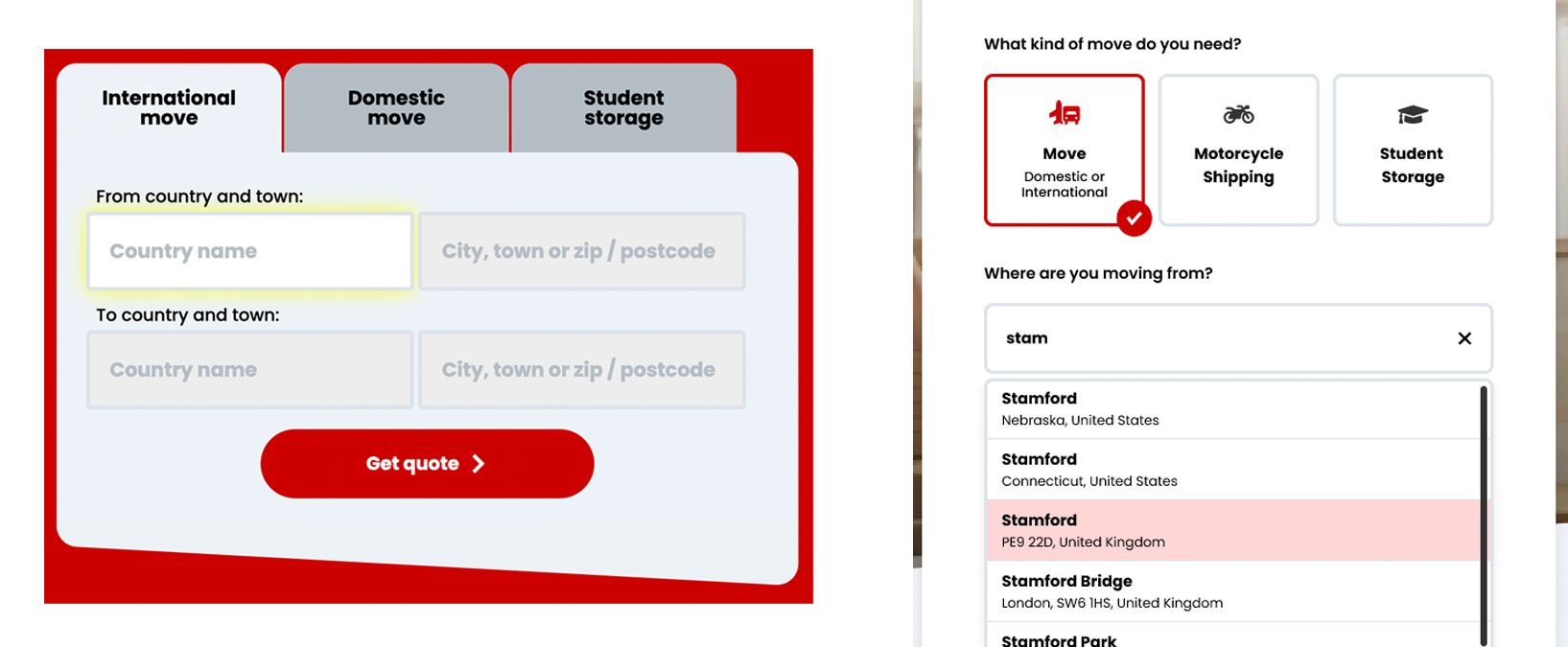Seven Seas Worldwide
How We Improved CRO and UX to Boost Conversions for Seven Seas Worldwide’s Quotation and Booking Platform

The Brief
We had worked with Seven Seas Worldwide (SSW) on their initial quoting tool several years prior using Design Sprints, that first iteration successfully moved their quotation and booking system leaps and bounds forward by improving their UX. Now, for V2, they needed a partner who could help improve their conversion rate optimisation (CRO), by quickly integrating with their existing team and translating four years’ worth of collected user feedback into a cohesive design strategy, user experience and performant Javascript frontend.
The challenge was multifaceted:
- Balance comprehensive data collection with user experience
- Transform 15 core user stories into an intuitive booking flow
- Solve complex technical challenges, particularly Chinese language support and international address validation
- Maintain brand consistency whilst introducing new functionality
- Deliver a modern and performant Javascript frontend that could link into their existing API to power the platform
Research & Strategic Discovery
We began with discovery in which we benchmarked other platforms, developed our own ideas and discussed technology options, all whilst working in concert with the SSW’s head of product and technology team. Rather than jumping to solutions, we invested significant time understanding the problem space through multiple lenses.
Competitive & Comparative Research
Research was a mix of comparative and competitive analysis. For comparative, we examined platforms like Task Rabbit and Air Tasker for service booking flows, Airbnb for date picker patterns (ultimately recommending their open-source solution), airlines for scheduling interfaces, and VW’s car configurator for progressive disclosure of options. We examined SSW’s direct competitors (Britannia Movers, Pickfords, GB Liners) not for inspiration but to ensure our solution would differentiate rather than replicate. The design goal was to balance these insights with the brand guidelines outlines by SSW.

User Story Analysis and ideation
SSW provided 15 user stories collected from customer feedback over four years. We broke down each story, exploring what they meant from both user and technical perspectives. For example, environmentally conscious users wanted to understand the carbon impact of their shipping choices. This single story spawned discussions about API integrations (we eventually recommended Ecologi, which SSW implemented), CO2 calculations across different freight methods, and how to present this information without overwhelming the quote flow.

User Journey Audit
To make sure the user journey could perform with as little friction as possible, we identified key moments in the existing booking flow that could be improved or removed. The areas that had the most room for improvement were the initial first clicks, for example, the city selection process. The UX wasn’t quite aligned with;
- What users were hoping for – a quicker selection process
- What the SSW team were hoping for – a linear progression and increase in conversions

Technical Problem-Solving
A significant portion of SSW’s market is in China, creating complex requirements around address lookup, Chinese language input, and translation. We researched multiple API options including Google Maps API, PostGrid, and Loqate for address validation, the assessments included guided demos and sandboxes of the options which really helped with the decision making. This technical research ensured our UX concepts were grounded in feasible implementation.
Continued Ideation & Prioritisation Workshops
Over multiple workshop sessions, we presented design concepts and facilitated collaborative decision-making. Ideas that emerged included live pricing that updates as users modify their quote, save and resume functionality for returning users, consistent progress indicators throughout the booking flow, shareable quotes, and an environmental impact calculator with offsetting options.

Wire framing & Prototyping
This phase represented approximately 50% of the project effort. Here, we translated ideas and hours of research into tangible user flows.
Working in Figma, we created wireframes mapping the complete user journey from initial quote parameters through service options to final pricing. We built interactive prototypes that allowed SSW stakeholders to experience the flow firsthand, identifying friction points before drafting the code. Through multiple iterations, we refined these flows based on feedback from bi-weekly sessions with the SSW team. This helped us maintain rapid iteration cycles whilst integrating their existing design system. This wasn’t about creating something unrecognisable. It was about strategic enhancement within established brand guidelines.

Design System Integration & Development
Once the UX architecture was solid, we focused on production-ready UI design. Rather than reinventing SSW’s visual identity, we thoughtfully applied their existing design system to the new flows, creating new UI components only where new functionality demanded it. One area where we applied the new UI was the location selector. We needed to integrate the data surfaced by the service provider (Loqate) while maintaining a smooth, linear progression across the user journey.

We provided comprehensive design specifications for our development team to follow, while aligning our recommended technology stack with SSW’s development team throughout implementation, ensuring we worked as one collaborative unit. We recommended the fast and reliable ReactJS framework, based on our proven success using it for similar platforms, enabling us to build more efficiently thanks to its modern feature set, extensive ecosystem, and active maintenance.

The outcome
It was a pleasure to continue our collaboration with SSW by providing CRO strategy, UX design, technical delivery, and rapid execution to support their ongoing operations and future growth. Through close integration with their team and by bringing specialised expertise in design strategy and user journey refinement, we helped them deliver an improved customer experience that significantly enhanced conversion performance across the quotation and booking process.
